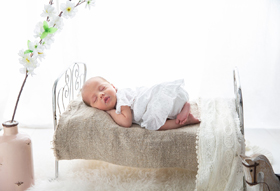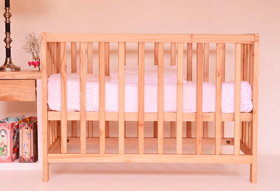
Nursery Grade Foam for Baby Cot Mattress

It's not uncommon for many of us to sleep on foam mattresses - whether memory foam or foam of a different sort. In fact, foam mattresses have grown in significant popularity over the past ten years and now, parents are wishing to share the comfort of foam bedding with their children. However, many do not realise that the foam commonly supplied for adult mattresses and cushions is not suitable for young children - particularly babies.
A specialist type of foam - known as nursery-grade foam - is required for all cots and soft foam furnishings intended for babies and young children. What immediately springs to mind is the risk of a product being a fire hazard, with many parents naturally cautious about surrounding their children with potentially flammable objects. Yet this isn't the primary concern when it comes to foam and young children. In fact, it is these same fire-retardant properties, enabled by the application of certain chemicals, that are most harmful.
Nursery-grade foam, and cot mattresses in particular, are constructed using a specialist flexible polyurethane foam that is free from certain flame retardants that are known to have detrimental effects on the body. Chemicals commonly used in other foam products (though not in any of eFoam's products) include arsenic, barium, antimony and phosphorous compounds. Each of these chemicals have been known to cause both neurological and physical delays and issues in young children and are therefore considered both toxic and inappropriate for such use.

All upholstery grades and nursery-grade foam mattresses sold by reputable suppliers such as eFoam comply with British Standards, a requirement which helps to reassure parents that their choice is both safe and comfortable for their child. As the British Standards requirements for cot mattresses are more complicated than that of regular foam products, it is worth noting that there are three 'BS' codes to look out for: BS 1877-10:2011+A1:2012, BS 7177:1996 and the newer BS EN 16890:2017. All acknowledge advanced safety standards in relation to nursery-grade foam, with the latter BS 2017 number confirming a number of quality safety tests in relation to cot mattresses.
With all this in mind, which product is the best choice for your child? At eFoam, our cot safe foam has been specially derived to fit both industry standards and our high customer expectations. Though phosphorous compounds can be used in the development of some types of cot foam, eFoam is proud to share the production of our own specialist grade of cot safe foam known as HR28 100, which is free from all harmful fire retardants including phosphorous. It is a soft-medium density foam that provides the most appropriate comfort and support for both babies and young children. Efoam can supply cot safe foam cut to size and shape.

It is worth keeping in mind that when buying a cot or cot bed mattress, you should ideally look for a firm and flat product. It is easy to find waterproof covers on the market that fit common cot mattress sizes, however at eFoam, we offer the option of cutting your cot mattress to a specific size to meet your requirements. When assessing the firmness of a mattress with your hand, there should be a small amount of resistance and the product should spring back immediately. Overall, we recommend that your cot mattress is at least 10cm thick to account for proper support of baby's weight.
Should you require further information on eFoam's nursery-grade foam, or if you would like to discuss your requirements with one of our friendly advisers, please contact us.

